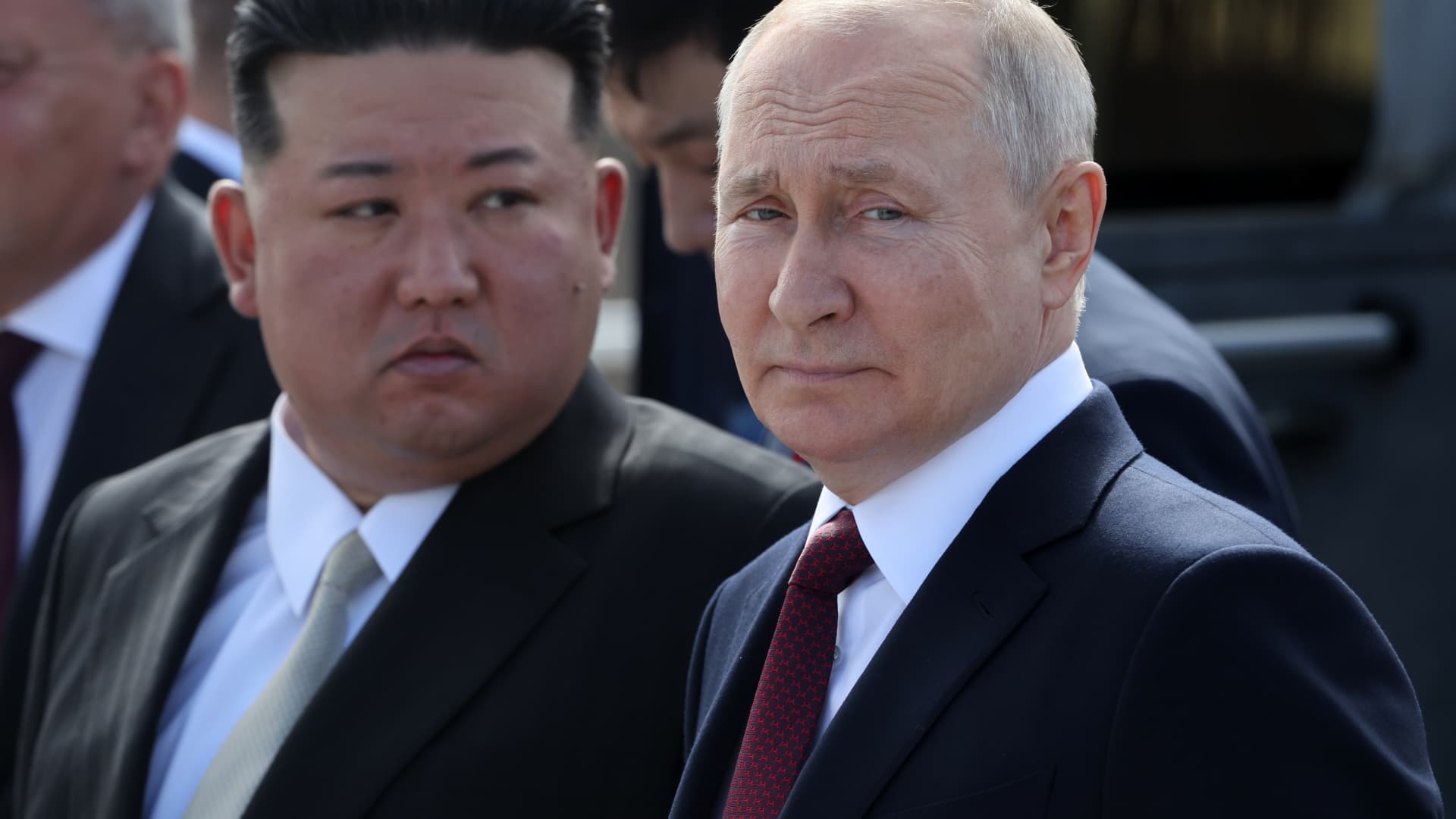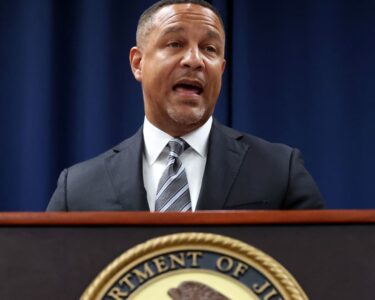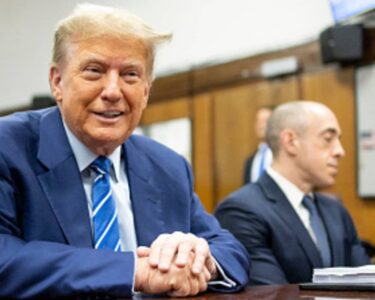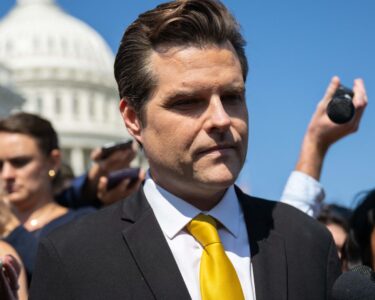This was CNBC’s live blog tracking developments on the war in Ukraine.
Relations between Russia and North Korea have reached a “new, strategic level,” Russian Foreign Minister Sergei Lavrov said at the beginning of his trip to Pyongyang Thursday, Russian state media reported.
Western officials have expressed alarm in recent months over deepening ties, accusing North Korea of supplying weaponry to Russia for use in the war against Ukraine. Russia and North Korea deny the allegations.
The trip to North Korea by Russia’s top diplomat comes hot on the heels of Russian President Vladimir Putin’s trip to China this week, where Putin said Washington’s decision to supply long-range ATACMS missiles to Ukraine was “a mistake.”
During Putin’s visit, Chinese President Xi Jinping praised the ties between Beijing and Moscow as the pair looked to strengthen their “no limits” partnership.
In other news, Ukrainian President Volodymyr Zelenskyy said the country’s defense ministry is working to improve communication with troops and to reduce paperwork and bureaucracy.
Kyiv’s forces have made some headway against Russian forces in southern Ukraine but face new Russian attacks around the eastern town of Avdiivka, the Ukrainian military said on Thursday.
In an update on Kyiv’s more than four-month-old counteroffensive in the south and east, military spokesperson Oleksandr Stupun reported an advance of 400 metres (0.25 mile) to the southwest of Verbove in the Zaporizhzhia region.
Verbove is a village a few kilometres east of Robotyne, a village recaptured by Ukraine last month as it tries to push south towards the Sea of Azov. Stupun told Ukrainian television the southern advance was still difficult because of Russian minefields and heavily fortified defences.
The Institute for the Study of War, a U.S. think tank and non-profit research group, said Ukrainian forces appeared to have broken through on the left bank of the Dnipro River in the southern Kherson region. Kyiv did not comment on the report.
When Ukrainian troops recaptured parts of the Kherson region last year, Russian forces pulled out of its biggest city, also called Kherson. But they only retreated as far as the other side of the Dnipro, from where they regularly shell the city.
Making progress against Russian troops has also been hard on the eastern front, where the Ukrainian military said its forces were under fire near the towns of Kupiansk and Avdiivka.
“They do not stop their attempts to encircle the city (Avdiivka), they continue to exert pressure there,” Stupun said. “They regrouped and launched new assaults there.”
Hanna Maliar, a former deputy defence minister, said the Russian assault on the eastern frontline was aimed at forcing Ukraine to bring in reinforcements from elsewhere.
Ukraine has said its troops are holding out around Avdiivka, which is seen as a gateway to the nearby Russian-occupied industrial city of Donetsk.
— Reuters
Ukraine’s Parliament on Thursday passed the first reading of a bill that could ban the Ukrainian Orthodox Church over its alleged connections to Russia.
Lawmaker Yaroslav Zhelezniak said on Telegram that the bill for the “prohibition of religious organizations associated with the Russian Federation” passed with 267 votes. Another lawmaker said the concern was over national security.
Officials have accused the church, which has historic ties to Moscow, of affiliation with Russia during the war. Its leadership denies this.
The bill still needs a second reading and presidential approval.
Tensions have mounted over the church’s status and moves by authorities to detain and evict senior clerics.
— Jenni Reid
President Joe Biden will address the nation on Thursday to discuss the U.S. response to the Israeli-Gaza conflict and the war in Ukraine, less than 24 hours after returning from Tel Aviv to offer Israelis support and aid for Palestinians in a trip upended by a hospital blast in Gaza.
His remarks, scheduled to be delivered from the Oval Office at 8 p.m. ET on Thursday (midnight GMT on Friday), come as Congress remains stalled without a leader in the U.S. House of Representatives needed to pass legislation, including funding requests.
Biden will offer a message of solidarity to the people of Ukraine and Israel, but moreover address the nation, including U.S. lawmakers, about the two conflicts’ impact, U.S. deputy national security adviser Jon Finer said in television interviews.
“This will also be very much a message to the American people: how those conflicts connect to our lives back here, how support from the American people and the Congress, frankly, is essential,” Finer told MSNBC.
The president returned overnight from his brief Israel trip aimed at offering U.S. support following the Oct. 7 Hamas attack on Israeli villages and military bases. In Tel Aviv, Biden pledged $100 million in new funding for humanitarian aid in Gaza and the occupied West Bank, and said he would ask Congress for unprecedented aid to boost Israel in its fight with Hamas.
The White House has said Biden would lay out his additional funding request this week. The administration is considering $60 billion for Ukraine and $10 billion for Israel, according to a source familiar with the matter.
Any funding measure must pass both the Senate, where additional aid has bipartisan support, and the House, which has not had a leader for 17 days, with Republican lawmakers who control the chamber split over whether to back conservative Jim Jordan, an ally of former President Donald Trump.
Republicans in the House, which is expected to hold another speaker vote later on Thursday, are also divided over whether to back more aid, with some far-right conservatives particularly opposed to money for Ukraine.
— Reuters
A U.S. journalist has been detained in Russia, marking the second such case since the war in Ukraine started.
Alsu Kurmasheva, a dual Russian-American reporter with Radio Free Europe/Radio Liberty (FRE/RL), was detained in the southwest Russian city of Kazan yesterday, the network said in a statement Thursday.
Kurmasheva was initially fined for failing to register her U.S. passport with the Russian authorities but was then detained on Wednesday and charged with failure to register as a foreign agent, the statement said, adding that the charge carries a maximum sentence of five years in prison.
Russia requires anyone receiving foreign “support” or funding to register and declare themselves as a “foreign agent.” RFE/RL is a U.S. government-funded media organization.
Based in Prague, Kurmasheva works with RFE/RL’s Tatar-Bashkir Service and reportedly traveled to Russia for a family emergency in May.
“She was temporarily detained while waiting for her return flight on June 2 at Kazan airport, where she had her U.S. and Russian passports confiscated and was not able to leave Russia since then,” RFE/RL said.
Kurmasheva’s detention comes seven months after Wall Street Journal reporter Evan Gershkovich was arrested on espionage charges in March. He denies the charges but faces up to 20 years in prison if found guilty.
NBC News has reached out to Russia’s foreign ministry and the U.S. embassy in Moscow for comment and is yet to receive a reply.
— Holly Ellyatt
Russia claimed Thursday that the Olympics can be used as a tool of political pressure and ethnic discrimination.
“The Games can be used as an instrument of political pressure against people who have nothing to do with politics. And as gross and in fact ethnic discrimination,” President Vladimir Putin claimed on Thursday, Reuters reported.
Last week, the Russian Olympic Committee was banned by the International Olympic Committee for recognizing regional organizations from four territories that Russia illegally annexed from Ukraine last year after sham referendums in the regions on joining Russia.
Although the IOC said the Olympic committees of Russia and Belarus would not receive an official invitation to the Paris Games like other countries later this month, Reuters noted, a decision on their participation is expected to be made at a later date.
— Holly Ellyatt
Russia’s foreign minister thanked North Korea for its support in the war with Ukraine and in return pledged “complete support and solidarity” for North Korea’s leader, Russia’s Foreign Ministry said Thursday.
Russian Foreign Minister Sergei Lavrov arrived in North Korea on Wednesday night and on Thursday held talks with the country’s foreign minister before meeting leader Kim Jong Un.
Commenting at a reception by North Korea on Wednesday, Lavrov said Moscow appreciated Pyongyang’s “unwavering and principled support” for its “special military operation” in Ukraine, as Russia calls its invasion, and unilaterally annexed parts of Ukraine.
“We deeply value your unwavering and principled support for Russia’s actions in the context of the special military operation in Ukraine, as well as your recognition of the Donetsk and Luhansk people’s republics, along with Zaporizhzhia and Kherson regions, becoming part of the Russian Federation,” Lavrov said, according to a statement on Russia’s Foreign Ministry website.
“We are fully aware that many countries worldwide share similar viewpoints and assessments, but only a select few, such as the DPRK, explicitly declare their solidarity with Russia and can express it openly,” he added.
“This ability is a hallmark of nations and governments that are truly independent, prioritise their national interests, and not fall for the tricks played by our Western counterparts,” Lavrov said.
In return, he added, Russia extended “its complete support and solidarity with the aspirations of the DPRK,” or the Democratic People’s Republic of Korea, he said.
The latest set of diplomatic engagements between the two largely politically isolated countries comes after a high-profile meeting between Russian President Vladimir Putin and Kim in September. Western allies are concerned that the allies are exchanging weapons for military technology, although Moscow and Pyongyang deny that.
— Holly Ellyatt
German Chancellor Olaf Scholz on Thursday slammed Russian President Vladimir Putin for his “cynical” warnings over the violence and civilian casualties resulting from the ongoing war between Israel and Palestinian militant group Hamas.
“I am more than outraged when hearing that the Russian president is warning everywhere that there could be victims, civilian victims of military confrontations. It really doesn’t get any more cynical than that,” Scholz said in a speech to the German Parliament, according to Reuters.
Putin has repeatedly expressed concern over the casualties of the Israeli-Hamas conflict, urging an end to hostilities and for Israel’s military not to press ahead with a ground incursion into the Gaza Strip. Divided between its interests in Israel and Hamas-supporting Iran, Russia has addressed the violence of the recent offensives in Israel, but has so far fallen short of condemning the Palestinian militant group for its terror attacks of Oct. 7.
Russia has simultaneously been waging a full-scale invasion of Ukraine since February 2022, which the Human Rights Watch says has has “a disastrous impact on civilian life, killing thousands of civilians, injuring many thousands more, and destroying civilian property and infrastructure.”
— Ruxandra Iordache
South Korea said it’s considering more “powerful” sanctions against North Korea and Russia if Moscow provides military technology to Pyongyang in return for North Korean weaponry, Yonhap news agency reported.
South Korea believes that weapons are going to Russia from North Korea, Unification Minister Kim Yung-ho said in an interview with Yonhap, adding that Western ally Seoul takes military cooperation between the two nations “very seriously.”
“If Russia offers military technology to North Korea, it indicates a serious threat to South Korea’s security. Then, we cannot help but seek powerful sanctions against Russia and North Korea with the U.S. and other nations,” Kim said in a joint interview with Yonhap News Agency and Yonhap News TV on Wednesday.
The White House said last week that it had satellite evidence that it said showed cargo from an ammunition depot in North Korea being loaded onto a Russian-flagged ship before it was taken by rail to a depot near Russia’s southwestern border.
The delivery took place between Sept. 7 and Oct. 1, the U.S. said, as reported by Reuters. The Kremlin rejected the allegations, saying the U.S. did not provide evidence for the claims. North Korea previously refuted allegations of any arms deliveries.
Russian President Vladimir Putin and North Korean leader Kim Jong Un met in September. There was speculation that the leaders discussed arms and military technology exchanges.
— Holly Ellyatt
Russian forces carried out new air strikes overnight on targets in eastern, southern and northern Ukraine, Kyiv’s military said on Thursday. There were no immediate reports of casualties.
The air force said 17 different weapons, including ballistic and cruise missiles and attack drones, had been used to strike industrial, infrastructure, civilian and military objects.
Ukrainian forces shot down three drones and one cruise missile, it said.
Russia has carried out frequent air strikes since launching its full-scale invasion of Ukraine in February 2022, including hitting population centres far behind front lines.
Moscow denies deliberately targeting civilians. It did not immediately comment on the latest reported air strikes.
Ukraine began a counteroffensive in the south and east in early June but has made only gradual progress against vast Russian minefields and heavily entrenched Russian forces.
— Reuters
The Crimea bridge linking the annexed Crimean peninsula and Russian mainland has likely become a heavy “security burden” for Russian forces, given repeated attempts to attack the strategically and symbolically important structure.
Last week, Russian Deputy Prime Minister Marat Khusnullin declared that damage from Ukraine’s strike on the Crimean bridge in July had been repaired ahead of schedule.
However, Britain’s Ministry of Defense commented Thursday that although the bridge may now be fully operational, use of it remains restricted in light of procedures that were enacted after the first Ukrainian attack in October 2022. Trucks and fuel supplies continue to be moved by ferry, for example.
“The Crimean bridge will remain a vital link in sustaining Russia’s occupation of Crimea and its forces in southern Ukraine,” the ministry said in an intelligence update on X, formerly known as Twitter.
“However, it is now almost certainly a significant security burden requiring multi-domain protection, including the use of air defence systems and crews who would otherwise be deployed elsewhere.”
The ministry noted that·Russian security forces’ “confidence in their ability to protect this large and vulnerable structure will continue to be threatened by the ingenuity of Ukraine’s military and security services.”
Ukraine typically does not claim responsibility for attacking Russian infrastructure but, in July, the head of its security service said his agency had been responsible for last October’s attack.
— Holly Ellyatt
Relations between Russia and North Korea have reached a “new, strategic level,” Russian Foreign Minister Sergei Lavrov said at the beginning of his trip to Pyongyang Thursday, Russian state media reported.
Speaking at the meeting with his North Korean counterpart Choe Son Hui at the Kumsusan government residence, Lavrov said relations continued to improve after Russian President Vladimir Putin’s recent meeting with North Korean leader Kim Jong Un.
“After the historic summit between President Putin and Chairman of State Affairs Kim Jong Un at the Vostochny Cosmodrome on September 13, we can say with confidence that these relations have reached a qualitatively new, strategic level,” Lavrov said, according to comments published by Tass.
Russia’s top diplomat did not give further details, but the comments will fuel concerns that Russia and the Democratic People’s Republic of Korea are deepening military ties, such as through weaponry supplies, amid the ongoing war in Ukraine. Russia and North Korea deny the allegations.
North Korea’s foreign minister commented that “private meetings of the foreign ministers of the two countries, during which ties of comradeship are strengthened, serve as proof that Korean-Russian bilateral relations, with a long history of friendship, show dynamics of development and are developing with new vitality.”
Western officials expressed concerns that Moscow and Pyongyang were discussing arms deals ahead of, and during, Putin and Kim’s meeting. North Korea denied it would supply weapons to Russia.
Last week, the White House said North Korea recently provided Russia with a shipment of weapons, showing satellite images that it said showed cargo from an ammunition depot in North Korea being loaded onto a Russian-flagged ship before it was taken by rail to a depot near Russia’s southwestern border.
The delivery took place between Sept. 7 and Oct. 1, the U.S. said, as reported by Reuters. The Kremlin rejected the allegations, saying the U.S. did not provide evidence for the claims.
— Holly Ellyatt
Ukrainian President Volodymyr Zelenskyy said the country’s defense ministry is working to improve communication with troops and to reduce paperwork and bureaucracy.
Ukraine’s Ministry of Defense has gone through a number of shake-ups in recent months, losing several key officials after a procurement scandal and then seeing former Defense Minister Oleksii Reznikov replaced by Rustem Umerov in early September.
Zelenskyy said he met Umerov and his new team Wednesday to discuss how to the make the ministry more agile and responsive.
“I held a meeting with the Minister of Defense of Ukraine – he presented his team, his program. The composition of the ministry has been updated. There are already the first steps to resolve the issues that the military talked about,” Zelenskyy said in his nightly address.
“Reduce bureaucracy, simplify document flow, all procedures, free up commanders’ time for combat work instead of paperwork,” he added.
Zelenskyy said there will be more “digitalization and clarity” in supplies to troops and that there should also “be more readiness for feedback from the military and overcoming the accumulated problems.”
— Holly Ellyatt
Ukraine released a statement Wednesday condemning Russia’s moves to withdraw from a global nuclear test ban treaty.
A law to revoke Russia’s ratification of the treaty passed through the Duma, Russia’s lower house of parliament, earlier in the day.
“The world is witnessing another provocative step of the aggressor state, aimed at increasing nuclear blackmail,” Ukraine’s Ministry of Foreign Affairs said in a statement, according to a Google translation.
The Comprehensive Nuclear-Test-Ban Treaty (CTBT) “remains one of the key legal elements of the global security architecture in the area of nuclear arms limitation and nuclear non-proliferation,” the statement said.
“Ukraine condemns Russia’s steps to withdraw ratification of the Treaty and calls on the international community to respond accordingly to Moscow’s provocations aimed at harming the object and purpose of the CTBT.”
The treaty was adopted by the United Nations General Assembly in 1996, though eight nations have not ratified it, including the United States.
— Jenni Reid
Russian President Vladimir Putin said the U.S. deciding to supply Ukraine with long-range missiles was “a mistake,” in a news conference in Beijing, as reported by Reuters.
“Firstly, this of course causes harm and creates an additional threat. Secondly, we will of course be able to repel these attacks. War is war,” Putin said.
“But most importantly, it fundamentally lacks the capacity to change the situation on the line of contact at all … This is another mistake by the United States,” he added.
Ukrainian President Volodymyr Zelenskyy said Tuesday that Ukraine had fired the first U.S.-supplied, long-range ATACMS missiles in a nightly address. Zelenskyy had repeatedly asked Washington for the weapons to help in its offensive.
Putin also criticized U.S. involvement in the war more widely.
“A mistake of a larger scale, as yet invisible but still of great importance, is that the United States is becoming more and more personally drawn into this conflict. And let no one say that they have nothing to do with this. We believe they do,” Putin said.
— Hannah Ward-Glenton
Russian President Vladimir Putin has been captured on camera with his so-called “nuclear briefcase,” Reuters news agency reported.
The briefcase, which can allegedly be used to order a nuclear strike, is said to never stray far from Putin’s side and is rarely filmed.
The footage shows the Russian leader walking between meetings, the report says, ahead of an entourage of naval officers.
“There are certain suitcases without which no trip of Putin’s is complete,” the Kremlin correspondents of state news agency RIA said in a post on Telegram under the footage, as reported by Reuters.
— Hannah Ward-Glenton
Russian President Vladimir Putin and his Chinese counterpart Xi Jinping had an “in-depth exchange of views” on the Israel-Hamas conflict, Chinese state media outlet Xinhua reported, according to a Google translation.
The two leaders met during Putin’s closely-watched trip to Beijing for the third Belt and Road Forum. The pair also discussed the “no limits” partnership between their two countries during the meeting.
Xi said that “China supports the Russian people in pursuing the path of national rejuvenation independently and safeguarding national sovereignty, security and development interests,” Xinhua reports.
The Chinese president said that both sides should promote the high-quality development of China-Russia cooperation and “actively explore cooperation in strategic emerging industries.”
— Hannah Ward-Glenton
Ukrainian forces launched at least 18 drone strikes on Russian field camps in the Kursk region of Russia, Ukrainian security service sources reportedly told the Kyiv Post and Ukrinform.
The drones hit military field camps near the village of Postoyalye Dvory, which is around 110 kilometers (68 miles) from the Ukrainian border, the Post reported.
Up to 3,000 Russian soldiers and approximately 80 units of military equipment are stationed in the area, according to the reports.
The Russian Defense Ministry did not immediately respond to CNBC’s request for comment.
— Hannah Ward-Glenton
U.S. providing missiles to Ukraine ‘a mistake,’ Putin says; China and Russia ‘exchange views’ on Israel-Hamas conflict






